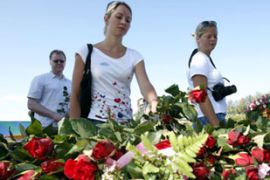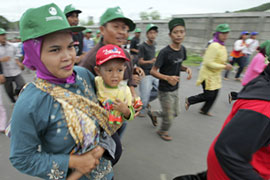Asia remembers tsunami tragedy
Thousands struggle to rebuild lives three years after huge waves wrecked havoc.

Published On 26 Dec 2007
In Thailand, survivors and families of victims were invited to Phuket’s Patong beach, a popular strip of hotels and restaurants, for a prayer service.
The tsunami had wrecked the tourist resort, killing more than 5,000, half of them foreigners on holiday.
Sombre occasion
At a village outside Calang town in Aceh, which was among the areas most devastated in Indonesia, about 1,000 residents, school children and officials attended an open-air prayer ceremony commemorating the victims.
“The third year anniversary is being held to remind us that the disaster was a test for human beings from God,” Azhar Abdurrahman, chief of the Aceh Jaya district, said.
The scale of the disaster had overwhelmed authorities in Aceh, where bodies littered devastated neighbourhoods for weeks.
Most victims were never formally identified and tens of thousands were buried in mass graves.
Susilo Bambang Yudhoyono, the Indonesian president, attended the drill in Banten province.
Tardy reconstruction
After the disaster, the world pledged $13.6bn dollars to house survivors and to rebuild devastated communities.
 |
| Indonesia staged a tsunami drill on Wednesday [Reuters] |
But in Indonesia, which expects to spend $8bn in total on recovery by April 2009, some of that money is thought to have been wasted with about 20 per cent of new homes standing empty.
Florian Vernaz, from Transparency International, told Al Jazeera that $8bn was much more than the expected needs and that problems with initial assessments and communication between agencies had meant some of the funds had been wasted.
“I think the main problem was a waste because of a lack of co-ordination,” he said. “Lack of co-ordination with local government and lack of co-ordination between implementing agencies.”
He agreed that corruption had also contributed to the waste of some funds.
“It [corruption] starts from the design of the project and selection of contractors to the implementation of the budget,” he said, adding that “there is [also] a problem with the availability of reliable of contractors”.
Unhappy survivors
In the Indian state of Tamil Nadu, where about 7,000 people were swept away in the tsunami, only 29,000 of a planned 53,000 houses have been built.
Many survivors are unhappy with the slow progress on rebuilding, and blame local government authorities.
“After the tsunami we got a relief package from the NGOs. However, after a long discussion with the government, we are now getting some houses,” Nagooran, a fisherman in Nagapattinam, one of India’s worst affected fishing towns, said.
But the International Red Cross on Wednesday struck an optimistic note, saying progress was being made on the ground. It said it would help about four million people with $1.7bn of aid by the end of the current year.
“Right across the region, we’re seeing real progress,” said Jerry Talbot, the organisation’s special representative for tsunami recovery.
“Thousands of houses are being built, along with schools, hospitals and clinics,” he said.
“We have said [all along] that recovery and rehabilitation would take at least five years. That is still the case. A lot of work has been done, but there is still much more to do.”
Source: Al Jazeera, News Agencies